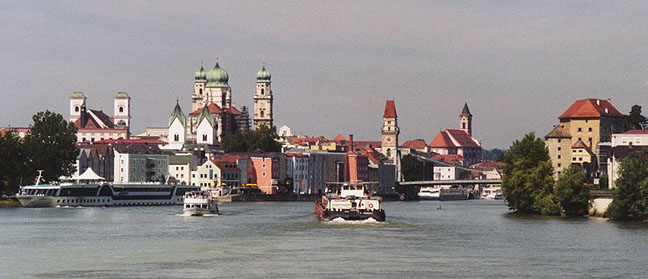

Passau

at the confluence of the Danube, Inn and Ilz rivers
Passau, city in the Federal Republic of Germany, in the state of Bavaria, situated on the Austrian border at the confluence of the Danube, the Inn, and the Ilz rivers, 150 km (90 mi) southeast of Munich.
along the Danube
Built on a narrow rocky tongue of land between the Danube and the Inn, Passau faces the wooded cliffs and the fortress of Oberhaus on the left bank of the Danube.
Oberhaus
(built in 1219 by Bishop Ulrich II)Passau originated as an ancient Celtic settlement named Boiudurum, later becoming a permanent Roman military camp, Castra Batava. After the foundation by Saint Boniface of the bishopric of Passau in 739, the town grew rapidly and was an important commercial and religious center during the Middle Ages.
St. Stephens cathedral
Baroque style
the interior ceiling
the Baroque pulpit
the altar
(modern, but in a Baroque interior)
the organ
(one of the largest church organs)It was created a city in 1225, and shortly thereafter the bishop became a prince of the empire. In 1552 the Treaty of Passau was signed there, granting religious toleration to the German states.
cherub from a Baroque stair
city hall tower
mural on city hall
the Prince-Bishop
The bishopric was secularized in 1803 and its lands came into the possession of Bavaria, but in 1817 the bishopric was restored on a jurisdictional level. Population (estimate 1994) 51,041.
Nibelungenhalle
(Nazi-era hall which seats 8000)
Monument to the Jewish people murdered by the Nazi
along the Inn river
![]()
![]()